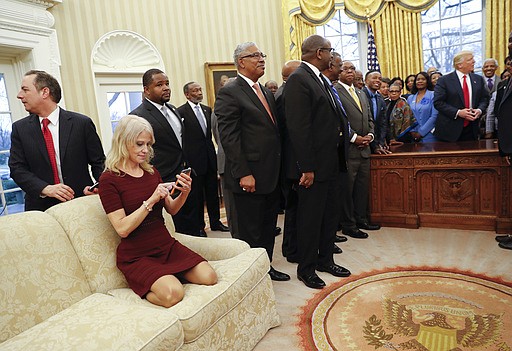Lincoln University President Kevin Rome said Friday his visit last week to Washington, D.C., "was an excellent trip, a great experience personally and professionally for the university and for HBCUs in general."
Rome was one of the presidents representing the nation's more than 100 Historically Black Colleges and Universities (HBCUs) at the meetings in Washington, organized to help explain the schools' existence, importance and need.
During their stay, the presidents spent time in meetings with lawmakers, Education Secretary Betsy DeVos and U.S. President Donald Trump.
"We were able to meet with significant Republican leadership in the House and the Senate," Rome told the News Tribune. "We were able to meet with Democratic leaders.
"And, for the president to take time to greet us, I think, was appropriate."
It also was historic, Rome noted, as it was the first time HBCU presidents as a group were invited to spend time in the White House.
Several of the college presidents attending that meeting said they felt it was a "photo opportunity" for Trump and his administration - and many of the news reports about the Oval Office visit Monday focused on presidential advisor Kellyanne Conway's kneeling on a couch so she could get a better picture of the group.
But, Rome said: "That's a distraction, and people (are) missing the significance of all of those (HBCU) presidents being in the Oval Office for the first time in history.
"And so, I won't let something like that distract from the significance of that event."
Many of the news reports on the meeting with Education Secretary DeVos have focused on a message she issued after the meeting - that HBCUs "started from the fact that there were too many students in America who did not have equal access to education. They saw that the system wasn't working, that there was an absence of opportunity, so they took it upon themselves to provide the solution."
DeVos also called the nation's HBCUs "real pioneers when it comes to school choice. They are living proof that when more options are provided to students, they are afforded greater access and greater quality.
"Their success has shown that more options help students flourish."
Critics argued DeVos' comments ignored history - the HBCUs existed because segregation policies and laws prevented African Americans from attending majority-white schools, like the University of Missouri, even when they wanted to.
Lincoln University's founding soldiers didn't specify the school be limited to African Americans, but they wanted a school to help former slaves and freed people learn how to read and write after an 1847 Missouri law prohibited blacks from learning those skills.
"I'm not defending her," Rome said. "But, I also think that people tend to pick one specific comment or one particular issue and they overlook the significance of the meeting and what we can potentially accomplish.
"The publicity - regardless of where one falls on the issue - placed us in a position to receive attention from the country and the world, which I think is positive."
Rome said he thinks the new federal education secretary, like others, is "learning about HBCUs, and I don't expect her to know everything about HBCUs. But this is an opportunity to educate her and other people in this country about historically black colleges and universities and the value that we add to the country and the world."
People who have attended an HBCU - or live in a community, like Jefferson City, that has one - may have a better understanding of the role the Historically Black Colleges and Universities have played in the country, he said.
"This allows us to expand our story and the knowledge of the great contributions that we continuously have made throughout the world," Rome said. "And I remain more optimistic than some of those who seem very negative about the meeting and what can come out of it."
Of the 105 HBCUs in the United States, 19 - including Lincoln - also have been designated as federal land grant institutions under an 1890 law that included them in programs begun in 1862 for other colleges and universities, like MU.
Rome said some of the issues the 1890 land grant schools are facing - such as their states providing more financial support to the 1862 schools than to the 1890 ones - also were discussed last week in Washington.
"We talked about the land grant match and wanting to see Congress take more of a role in (having) the states complying to their requirement of the match," he said. "But we're also having a subsequent meeting (later this year) that will only focus on 1890 institutions."
Although nothing specific was announced last week that directly benefits Lincoln immediately, Rome said, "I feel that it's important for Lincoln to be present and engaged in part of the conversation.
"And, if nothing else comes out of this meeting, it has brought our issues to light to a broader audience.
"And awareness is the first step."

